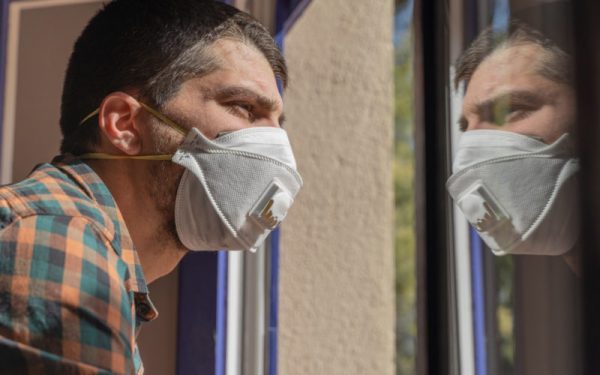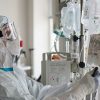Molecular biologist Irina Yakutenko talks on how covid differs from smallpox and how the second wave is met in Europe
 In Russia, the incidence of coronavirus has gone up sharply: for several days in a row there are more than 8 thousand infected per day. The Ministry of Health said that almost 90% of beds for patients with COVID-19 are occupied in hospitals. Can it be called the second wave of the pandemic, what is the likelihood of introducing quarantine and how the European countries are trying to avoid a second lockdown? Molecular biologist and science journalist Irina Yakutenko told Pravmir.
In Russia, the incidence of coronavirus has gone up sharply: for several days in a row there are more than 8 thousand infected per day. The Ministry of Health said that almost 90% of beds for patients with COVID-19 are occupied in hospitals. Can it be called the second wave of the pandemic, what is the likelihood of introducing quarantine and how the European countries are trying to avoid a second lockdown? Molecular biologist and science journalist Irina Yakutenko told Pravmir.
– Was the lockdown in the spring an effective remedy against the epidemic? Is it possible now, during the second wave of coronavirus, to expect a new quarantine?

Irina Yakutenko
– Let’s start with the fact that the figures do not show that the first wave has been extinguished in Russia. That is, there was a decrease, but the number of new cases remained quite significant. Rather, it makes sense to talk about the continuation of the first wave, which was held back a little, and then it went up again. The second wave can be talked about when, as in Europe, the number of infections drops to dozens of cases per day.
And hence the answer to the question follows. Quarantine is, of course, an effective way to contain epidemics, and for a long time mankind had no other way to do this. But at the same time, it is important to weigh the balance of risk and benefit. Of course, if we lock everyone in quarantine, then we will achieve that we will break the chains of infection that have formed and stop the epidemic.
But it is impossible to keep the quarantine for long, because it will kill the economy. Quarantine will have to be ended at some point, after which the incidence will inevitably grow.
Therefore, the question arises: what to do after the quarantine is lifted?
In Russia, quarantine was lifted on impulse. As we remember, at first people received fines for leaving the house, and literally the next day all restrictions were lifted, and everything was allowed.
Such a sharp lifting of quarantine without preserving de facto restrictive measures leads to the fact that everything starts anew. Because a rather small number of people fell ill, the clusters that are most actively infected and spread the virus did not “burn out”. This means that when we lift the quarantine, the epidemic will grow again. This is especially true for schools.
Who Are Covid Super-Distributors
– Quarantine has been introduced in Israel again. Does this mean that they also ended the previous incorrectly?
– Exactly. Formally, they retained restrictive measures, but not all people complied with them. This is especially true for Orthodox Jews, among whom there are quite a few covid dissidents. They did not comply with any measures, while they have large families, that is, the virus had a place to roam. However, the secular population also did not really follow the sanitary standards.
Therefore, such a colossal increase occurred, and the second wave in Israel far exceeded the first in terms of the number of infected. Because of this, they now had to quarantine again.
– In many countries, the number of infected people has also begun to increase, but total quarantine is not introduced there. They are trying to stop the epidemic with milder measures. What is the reason for this? Do they understand something better about the virus or fear for the economy?
– Quarantine is a very rough measure. We used it in the first wave, because we knew nothing about this virus. In order to avoid overloading the healthcare system, many have decided to shut down, because it will most likely work, albeit at a high cost.
But today we already know that this virus does not spread evenly across the population, like measles or smallpox, which can only be fought with universal restrictions or vaccination. This virus is not like that. It is distributed by so-called super-distributors. Most of the infected transmit the virus to one person or do not infect anyone at all, but some infect dozens or hundreds of people at once. This is due to both biological and social characteristics.
Biological factors are, for example, when a person has an increased concentration of the virus in the upper respiratory tract, or it lasts longer, or when they speak more saliva flies out of the mouth and because of this many people become infected at once.
Social factors are equally important. If a person stays at home on isolation, then it doesn’t matter what his biological characteristics are. But if he goes to a bar, he will infect all his friends at once. And the virus spreads mainly in this way: in clusters, through colleagues at work, bar visitors, those who went to a concert. We see that this is how the virus spreads.
And in order to limit the spread of the virus before a vaccine appears, to curb the increase in incidence, it is necessary to control situations in which clusters of infection can form. That is, there is no need to introduce a general quarantine. It is worth looking at the situations in which infections most often occur, and control these situations. For example, to ban large concerts and impose restrictions on bars. That said, there are clusters that we cannot avoid. For example, schools, kindergartens, universities. Since it is impossible or very difficult to impose a ban or restrictions in this case, here you need to act differently – regularly, every day or every other day, conduct tests to identify active carriers, those who infect others today, right now, in order to isolate them.
Long Holidays and Sweden’s Way
– The fact that Moscow schoolchildren stay on vacation not for a week, but for two, will not change the situation, will it?
– Of course, it won’t affect anything. They won’t become immune in two weeks and will return to school just as non-immune to the virus as before. And everything will repeat itself.
In addition, in Moscow, the system of additional education and all kinds of children’s entertainment is very developed, and children left at home on vacation will go to some sections, clubs and other activities, which in most cases take place in closed rooms.
That is, the schools are closed, but the children will not stay at home, especially considering that these holidays were a surprise for their parents. And as a result, schoolchildren will infect each other in centers and clubs.
– Sweden did not impose strict quarantine. How is the situation there now?
– The incidence there is slightly higher than in neighboring countries, but in general, everything is pretty smooth. But it is a common mistake to think that no restrictive measures were introduced in Sweden.
Sweden has a fairly disciplined population, and besides, the population density is not very high, with the exception of Stockholm. But even it cannot be compared with Moscow. De facto, people there keep their distance and wear masks in public places. In addition, the Swedes are seriously concerned about the safety of nursing homes, where many people died in the first wave.
But it should be understood that the Swedish option is impossible in Moscow or, say, in London due to population density, a completely different structure of movements, and so on.
– That is, for Moscow, the ideal option is to return back to full quarantine?
– By no means. This is the worst option imaginable because it is killing the economy.
In Russia, as in Europe, the increase in incidence began in mid-summer. Before that, there was a short respite from the end of May to July to develop strategies to combat: limiting clusters and mass testing. Nobody did this, and now everyone is faced with the results. We’re in a growing situation again, and everyone is frantically trying to figure out what to do about it.
Now there is already data on which situations are the most dangerous from the point of view of infection. First of all, this is a massive gathering of people, especially indoors. Not all of these situations are equally dangerous. For example, if everyone in transport keeps their distance and wears masks, it is not particularly dangerous. And concerts, clubs where everyone communicates closely without masks and speaks loudly are dangerous. That is, these situations need to be limited, and in those places where restrictions are impossible, regular testing is necessary in order to quickly send active carriers that can infect others for self-isolation.
Germany: Many Tests and Few Critically Ill Patients
– What is the current situation with the coronavirus in Germany and what measures are being taken there?
– Germany, in terms of the increase in cases, returned to the situation that was in April. But now the virus has become more evenly distributed throughout the country.
In terms of measures, Germany has a very well established testing and contact tracing system. That is, a huge number of tests are carried out, the contacts of the infected are monitored as much as possible and everyone with suspected coronavirus is sent to self-isolation.
The country has banned large gatherings, tightened control over the wearing of masks, and for example, in the center of Munich, they have become mandatory on the street. But there is no talk of radical measures and the introduction of quarantine yet.
– In Russia, almost 90% of beds intended for patients with coronavirus are now occupied, and in Germany only a small part is occupied, while in both countries there is an increase in the incidence. Why does it happen?
– The large number of people infected in Germany is due to the fact that the incidence began to grow after mid-summer. But also the reason for this is the increase in the number of tests. Many asymptomatic and mild patients are identified, and therefore the occupancy of hospitals is lower.
In addition, good treatment protocols have emerged. All over the world, doctors have learned to treat patients with coronavirus much better. And therefore, patients are in a severe stage less often. And they less often get to the intensive care ward than in the spring.
As for the difference in hospital occupancy, this may be due to different hospitalization rules. If we look at the protocols and compare the German and Russian clinical guidelines, we will see that in Russia it is assumed that a person is admitted to the hospital at an earlier stage. Perhaps overcrowding of hospitals is partly due to this.
That is, there are really fewer seriously ill patients, because they have learned to treat them better. But in Russia there is a trend towards earlier hospitalization. Finally, it is possible that, due to different testing algorithms and a smaller number of tests performed, it is mainly those who are ill at later stages that are detected. If this is so, then there are more people actually infected in Russia, which means there are more of those who will need hospitalization.
If Everyone Wears Masks, Can We Do Without A Lockdown?
– If in Russia everyone starts to follow the measures 100%: wear masks, keep a distance, will this allow us to do without quarantine and harsh measures?
– In order to avoid tough restrictions, it is necessary not only for everyone to wear masks and keep a distance, but also to resolve the issue with children’s institutions. In schools and kindergartens it is almost impossible to force children to wear masks. We need to carefully think about what to do with those places that cannot be closed and where it is impossible to provide adequate distance and masks. If we understand what to do with this, then yes, it will be possible to do without strict quarantine.
This is exactly how it works in Germany: the disciplined implementation of simple rules about masks and distance, intensive testing and contact tracing keep the numbers at acceptable levels that do not force quarantine. That is, hospitals are not overcrowded, and intensive care wards are partially filled.
– What is the probability that general quarantine will be introduced in Russia again?
– In this case, it is such a rare situation when we can say that the forecast depends very much on what decisions will be made in the government offices.
We have studied the nature of the virus well enough to understand which actions will slow down the epidemic and which will not. If these actions are not taken in time, the spread of the virus will again accelerate to dangerous levels, and quarantine will have to be reintroduced.
– Does the forecast depend on whether people will comply with the measures, including wearing masks?
– Oh sure. One of the problems now is the low agreement of the population with the observance of the measures. But this can also be influenced by the state. In Germany, at first, no one controlled the wearing of masks in transport, and after a while it became clear that not everyone was doing this. The supervisory authorities began to issue fines of 20-500 euros, depending on the federal state, for not wearing masks, which greatly increased the willingness of the population to comply with the measures. That is, the punishment works in this case.
But besides this, it is worth using propaganda in the good sense of the word. If people start to systematically inform other people about the danger of the virus and the need to wear masks, then the percentage of those who do this will grow. If you tell them for a long time that covid is no worse than the flu, it is hardly surprising that so few people take precautions.
Translated by Alyona Malafeeva

















